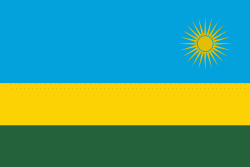Rwandan franc
Fr
The Rwandan franc (sign: FRw, and possibly RF or R₣; ISO 4217: RWF) is the currency of Rwanda. It is subdivided into 100 centimes.The franc became the currency of Rwanda in 1916, when Belgium occupied the previously German colony and the Belgian Congo franc replaced the German East African rupie. Rwanda used the currency of the Belgian Congo until 1960, when the Rwanda and Burundi franc was introduced. Rwanda began issuing its own francs in 1964, two years after gaining independence.
A proposal exists to introduce a common currency, a new East African shilling, for the five member states of the East African Community. Whilst originally scheduled to occur by the end of 2012, as of December 2020, a common currency has still yet to be introduced.
Country
-
Rwanda
Rwanda (u Rwanda ), officially the Republic of Rwanda, is a landlocked country in the Great Rift Valley of Central Africa, where the African Great Lakes region and Southeast Africa converge. Located a few degrees south of the Equator, Rwanda is bordered by Uganda, Tanzania, Burundi, and the Democratic Republic of the Congo. It is highly elevated, giving it the soubriquet "land of a thousand hills", with its geography dominated by mountains in the west and savanna to the southeast, with numerous lakes throughout the country. The climate is temperate to subtropical, with two rainy seasons and two dry seasons each year. It is the most densely populated mainland African country; among countries larger than 10,000 km2, it is the fifth most densely populated country in the world. Its capital and largest city Kigali.
Hunter-gatherers settled the territory in the Stone and Iron Ages, followed later by Bantu peoples. The population coalesced first into clans, and then, into kingdoms. In the 15th century, one kingdom, under King Gihanga, managed to incorporate several of its close neighbor territories establishing the Kingdom of Rwanda. The Kingdom of Rwanda dominated from the mid-eighteen century, with the Tutsi kings conquering others militarily, centralising power, and enacting anti-Hutu policies. In 1897, Germany colonized Rwanda as part of German East Africa, followed by Belgium, which took control in 1916 during World War I. Both European nations ruled through the Rwandan king and perpetuated a pro-Tutsi policy. The Hutu population revolted in 1959. They massacred numerous Tutsi and ultimately established an independent, Hutu-dominated republic in 1962 led by President Grégoire Kayibanda. A 1973 military coup overthrew Kayibanda and brought Juvénal Habyarimana to power, who retained the pro-Hutu policy. The Tutsi-led Rwandan Patriotic Front (RPF) launched a civil war in 1990. Habyarimana was assassinated in April 1994. Social tensions erupted in the Rwandan genocide that span of one hundred days. The RPF ended the genocide with a military victory in July 1994.
